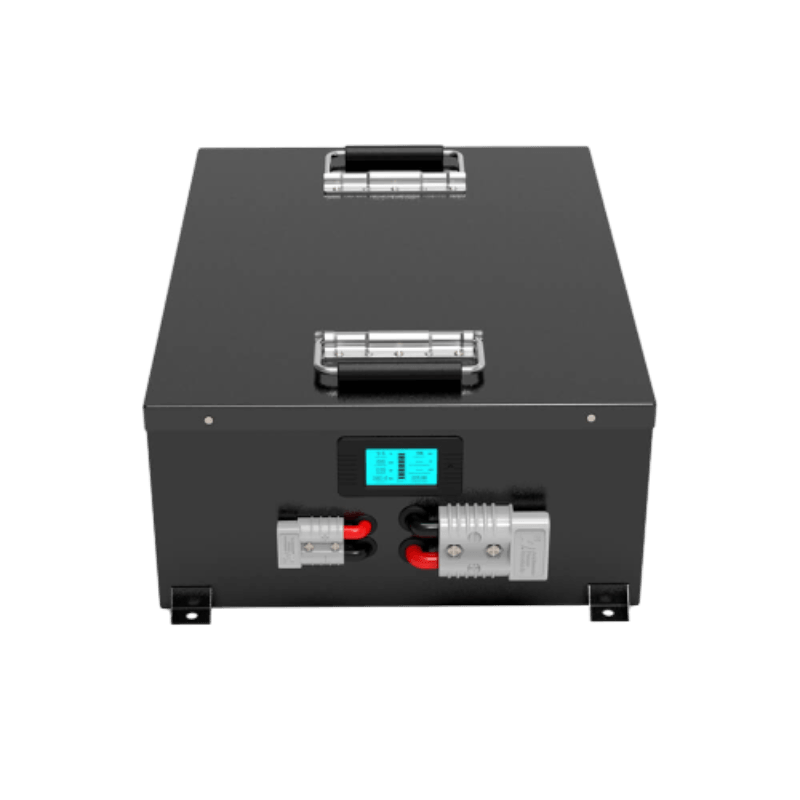The use of lithium-ion batteries for forklifts is becoming more common in the material handling industry. Their quick charging, long life span, and opportunity charging ability make them a top choice for many businesses. However, despite their advantages, there are still many misunderstandings that prevent companies from fully embracing this technology.
Let’s walk through the top 9 misconceptions about forklift lithium-ion batteries, and clear up the confusion with facts from industry experts.
1. We Do Heavy Lifting – Electric Machines Can’t Handle That
One of the most common misconceptions is that electric forklifts powered by batteries lithium-ion can’t handle heavy loads. This is no longer true. Today’s electric machines are designed to perform just as well as internal combustion engine (ICE) forklifts.
Take the Hyster® J2.5-3.0XNL as an example. It offers lifting power that matches hydrostatic IC trucks. In fact, the lifting capacity is based on the truck’s capacity plate – not its energy source. So if a lithium-powered truck has the same capacity rating, it can handle the same load.
It’s also worth noting that electric forklifts are more energy-efficient than ICE models. The only concern is whether the machine has enough energy storage to complete a shift. Fortunately, batteries lithium-ion can be quickly topped up during breaks, thanks to their opportunity charging feature.
2. Replacing Lead-Acid Batteries with Lithium-Ion Is All You Need
While swapping out les batteries au plomb-acide with lithium-ion alternatives can offer significant benefits, it’s important to look deeper. To truly get the most from this technology, you should consider a manufacturer-approved lithium-ion battery system, not just a third-party aftermarket replacement.
Yibai lithium offers OEM battery systems that feature CANbus connectivity, allowing the forklift’s onboard diagnostics to work seamlessly. OEM-approved systems also enable technicians to troubleshoot directly through the forklift’s software—no third-party support required.
Before replacing lead-acid batteries, ask:
Does your operation allow time for frequent short charges?
Are your existing power infrastructure and outlets suitable for high-output chargers?
Do you need additional charging stations near work areas to reduce travel time?
A well-integrated lithium system offers more than power—it streamlines operations and reduces long-term costs.
3. Lithium-Ion Batteries Are Too Expensive
It’s true that batteries lithium-ion have a higher upfront cost than les batteries au plomb-acide, but that’s only part of the story. The key is to look at total cost of ownership.
Thanks to longer cycle life, less maintenance, and improved energy efficiency, the cost per use of lithium-ion batteries is significantly lower. For example, Yibai lithium batteries are engineered with low internal resistance, making them more efficient and reducing grid energy waste by 30% compared to lead-acid.
As lithium prices continue to fall, a lithium battery with the same energy capacity now costs roughly 1.5 times that of a lead-acid battery—while lasting over twice as long. In the long term, lithium is clearly the more cost-effective solution.
4. We Must Replace the Entire Lead-Acid Fleet
It’s understandable to want consistency across your fleet, especially if you’re considering switching to lithium-ion. Replacing all machines ensures that operators don’t need to switch between charging systems or follow different maintenance routines.
However, a full replacement is not mandatory. Many companies have successfully managed mixed fleets, gradually transitioning over time. This approach is ideal when only part of your fleet operates under high utilization or when budget constraints exist.
In mixed fleets, make sure:
Chargers are compatible with each battery type.
Charging areas are clearly labeled.
Staff is properly trained to handle both technologies.
Yibai lithium offers support for phased rollouts, helping businesses transition without disruption.
| PARAMETER | LEAD-ACID BATTERIES | LITHIUM-ION BATTERIES |
| No. of shifts with one battery | 1 | Up-to 3 |
| Charging time | 8 hours | 2-3 hours |
| Opportunity charging | Possible, however battery life reduces drastically | Charging for as low as 5-10 minutes whenever possible |
| Safety & Health Risks | High | Low |
| Watering the battery | Oui | N/A |
| Maintenance Cost | High | Low |
| Battery LifeSpan | 1500 cycles | 3500 cycles |
| Electrical Infrastructure | Use existing | May need Upgrade |
| Replacement cost | High | Low |
| Energy Efficiency | Low | High |
| Electricity Cost | High | Lower |
| Upfront Cost | Low | High |
| Total Cost of Ownership | High | Low |
| Environment Friendly | Non | Oui |
5. Our Facility’s Power Supply Needs a Major Upgrade
Yes, lithium-ion battery chargers do require higher input currents than traditional lead-acid chargers. But that doesn’t necessarily mean a complete power system overhaul.
Yibai lithium works closely with leading charger manufacturers like SPE, Fronius, and Delta-Q. This partnership ensures many existing chargers are compatible, reducing the need for new equipment.
Additionally, battery/charger combinations are optimized for each application, allowing you to match your operation’s needs without overspending on infrastructure.
6. Drivers Need to Change Their Habits
Switching to batteries lithium-ion does involve some changes, especially regarding charging routines. However, these changes make life easier, not harder.
Standard safety practices (like AS2359:2) require ongoing training, so implementing new protocols during the switch makes sense. With lithium-ion, you can eliminate many manual tasks:
No more watering batteries
Non hazardous replacements
No need to open the hood to charge
Drivers simply plug in the charger during breaks. The Battery Management System (BMS) automatically handles the rest, protecting against overcharge, deep discharge, and overcurrent.
Once retrained, most operators find the simplified maintenance et convenient charging make their jobs easier and more efficient.
7. Lithium-Ion Isn’t as Safe as Lead-Acid
This is one of the biggest myths. In reality, batteries lithium-ion are safer than lead-acid, provided they are manufactured by a reputable supplier like Yibai lithium.
Modern lithium batteries come with multiple layers of protection, including:
Advanced Battery Management Systems (BMS)
Safety-rated cells and modules
Rugged casings to withstand tough environments
Yibai lithium batteries meet international safety certifications like UL2580, IEC62619, CE, and UN38.3, ensuring they’re safe for even the most demanding applications.
8. Lithium-Ion Batteries Don’t Last As Long
In fact, the opposite is true. Lithium-ion batteries can last more than 4,000 full cycles, compared to around 1,500 cycles for lead-acid batteries.
What gives lithium this edge?
Higher energy density
Better voltage stability
Lower internal resistance
This combination allows lithium-ion batteries to deliver more power, charge faster, and work more efficiently for longer periods. The result is a battery that stays productive over many years of operation.
9. They Don’t Work in Harsh Environments
Some believe that batteries lithium-ion can’t handle cold weather, rough terrain, or high-vibration environments. But field tests have proven otherwise.
Yibai lithium batteries are designed to perform in:
Low temperatures
Rough industrial floors
Intensive shift operations
Each battery pack comes with a datasheet and manual specifying the temperature range et operating limits. Custom solutions are also available for extreme use cases.
When properly specified, lithium-ion batteries are a perfect fit even for the toughest job sites.
Témoignages de clients

FAQs About Custom Forklift Batteries
Can I use my old lead-acid charger with a Yibai lithium battery?
It depends. Many existing chargers are compatible, especially from brands like SPE, Fronius, and Delta-Q. Check with Yibai lithium support for confirmation.
How long does it take to charge a Yibai lithium battery?
Most batteries reach 80% charge within 1–2 hours. Full charges typically take 2–3 hours depending on the charger and battery size.
Is retraining necessary when switching to lithium-ion batteries?
Yes, basic retraining ensures safe and optimal operation. The good news is that training is minimal and the systems are user-friendly.
Are lithium-ion batteries really maintenance-free?
Yes. No watering, cleaning, or equalizing is required. Just plug and play.
Can lithium-ion batteries operate in freezers or cold storage areas?
Yes. Yibai lithium offers solutions specifically designed for low-temperature environments.
If you have any questions, comments or concerns about lithium forklift battery packs and want to get the right information for yourself, the knowledgeable experts at Yibai Lithium Battery will be happy to help. Please call us anytime during normal business hours at +86-177 7381 1180 or email info@yibaienergy-china.com anytime
